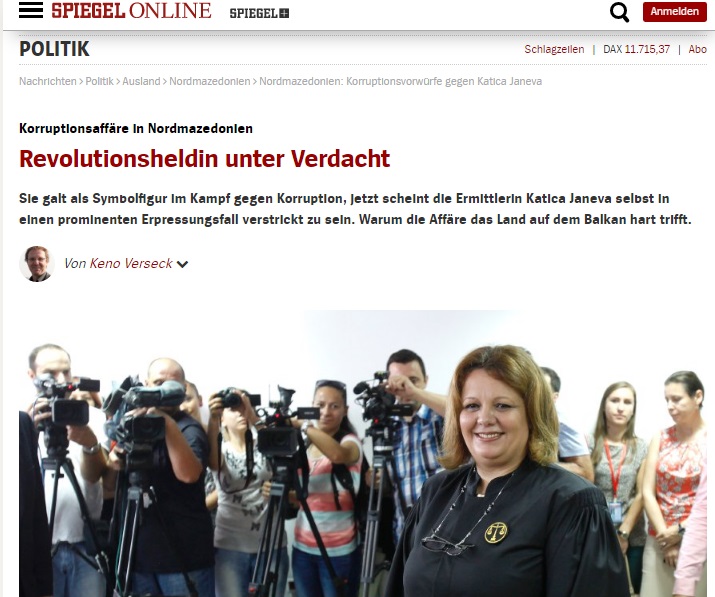Germany’s Spiegel magazine also got interested in the “Racket” affair, which has been stirring the public in Macedonia and the region for more than a month. Today this media outlet ran the headline: Revolution Heroine under Suspicion! Corruption affair in North Macedonia!
The article begins with Special Prosecutor General Katica Janeva, who is said to have been considered a symbol in the fight against corruption, but herself seems to be involved in a major racket affair.
The revolution heroine, the prosecutor who was considered as a symbol of reforms, a symbol of the rule of law, as a figure in the fight against corruption, now herself seems to be involved a major racket affair. The Balkan country was hit by the “Racket” affair and the fact that Janeva, who was considered incorruptible, a symbol of justice in the country, was involved in it, wrote the German magazine, commenting also on Janeva’s resignation on July 15.
The magazine comments that the “Racket” case that stirred the public affairs is being scrutinized at the highest level, causing a political earthquake for the whole country. Prosecutor Janeva is part of the affair, meaning there is no doubt that he promised the Macedonian oligarch to secure his freedom for a million.
The public is deeply shaken, media and social networks are full of comments. Janeva was one of the symbols of the “Colorful Revolution” that toppled Gruevski. For months tens of thousands of people took to the streets. The demonstrations usually started in front of the SPO building in Skopje. Many people wore T-shirts depicting prosecutors Katica Janeva, Fatime Fetai and Lence Ristoska.
This heroine myth is now broken. The affair came to light on 15 July, when Janeva surprisingly informed about her resignation as SPO’s head. At the same time, Bojan Jovanovski and Zoran Milevski were arrested, allegedly as masterminds in the “Racket” case, wrote the German magazine.
According to “Spiegel”, Bojan Jovanovski aka “Boki 13”, is an eccentric media promoter, and he and his accomplice are said to have promised the oligarch Jordan Kamcev to use their influence to protect him from prosecution. Jovanovski relied on his friendship with Janeva and boasted about being able to influence the SPO head. Kamcev allegedly paid 1.5 million euros.
It was proven with audio and video recordings, the German magazine comments.
According to Spiegel, he is considered the richest person in Macedonian and at the same time in the country. One of his main partners is the intelligence chief Saso Mijalkov, a mastermind in Gruevski’s regime. Spiegel says those are central figures in the “Empire” case that the SPO opened.
At that time, the two were first in custody. While Mijalkov was later put under house arrest, Kamcev was released. Janeva is said to have played a decisive role in this and to have personally promised the oligarch that he has nothing to fear.
Katica promised Kamcev that he should not be afraid of anything, and this is confirmed by the audio and video recordings that Kamcev had taken himself. The recordings were published in the Italian media La Verita.
Furthermore, the magazine comments on the dissatisfaction of the citizens in the country. As the article says, dissatisfaction with the government is growing, and the SDSM responds minimally to the affair.

Prime Minister Zoran Zaev even left the impression that he has something to hide. Journalists asked him if he knew Bojan Jovanovski personally, as he had claimed in one of the audio recordings that the prime minister would make “no problems” in Kamcev’s release. Zaev responded irritably that he would not allow the government to be overthrown by “criminals, a vain journalist and a fagot”. A remark that triggered a storm of reactions, Spiegel writes.

The affair shakes North Macedonia in a delicate situation. Because of the sluggish rule of law reforms, dissatisfaction with Zaev’s government is growing inside. In terms of foreign policy, the country is under pressure because the start of EU accession negotiations was postponed in June, partly because of reservations in France, the Netherlands and Germany because of a lack of anti-corruption measures and judicial reforms. The “Racket” case now seems to confirm the reservations, writes the magazine.




Comments are closed for this post.